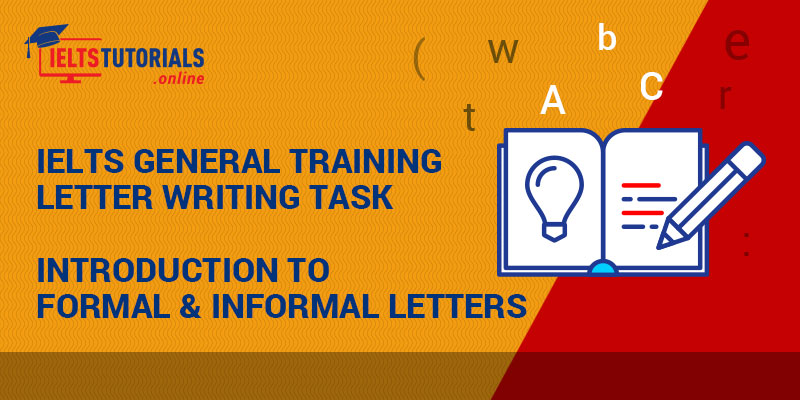
IELTS General Writing Task 1: Acquire Proper Understanding of Formal & Informal Letters
When you start practising for IELTS General Training Writing Task 1, you will find different scenarios to write a letter. Every letter writing question will have specific instructions, and you have to follow them.
There are different formats of letter writing, and each format requires a different style of writing:
- Definite starting and closing salutation
- Formal and informal expressions
- Various type of grammatical forms
Before you begin with IELTS Writing Task 1 General, you must -
- Read the given instructions carefully
- Identify the type of letter
- Understand the purpose of letter
- Plan the format of your letter
Take these points into consideration whenever you write a letter to score high in the exam. No matter how well you write, you could lose your score if you forget to consider the mentioned points.
Types of Letter
- Formal Letter
- Informal Letter
But, how will you know what kind of letter you must write? It's simple! Identify the purpose and know the types of letter.
Understand The Purpose of The Letter
You can recognize the letter type by checking -
- What is the situation?
- Do you know the addressee or not
If you are writing a letter of complaint, signing up the business contract, applying for a new job, resigning from an existing one, or writing to an unknown person, it will always be a formal letter.
Let's take an example for both the letters to understand better
Formal letter
You live in a room in college which you can share with another student. However, there are many problems with this arrangement and you find it very difficult to work.
Write a letter to the accommodation officer at the college. In the letter
- Describe the situation
- Explain your problems and why it is difficult to work
- Say what kind of accommodation you would prefer
Write at least 150 words.
You do NOT need to write any addresses.
Begin your letter as follows:
Dear Sir or Madam, |
Source: Cambridge English
In the above example, there is no name mentioned for the accommodation officer so consider it as a formal letter.
Informal letter
If you are writing a letter for inviting someone you know for a birthday party, thanking a friend or asking for an advice, it is always an informal letter.
In the case of an informal letter, you are aware of the name of the addressee.
Here is an illustration to make you clear about informal letters.
A friend has agreed to look after your house and pet while you are on a holiday.
Write a letter to your friend. In your letter
- Give contact details for when you are away
- Give instructions about how to care for your pet
- Describe other household duties
Write at least 150 words.
You do NOT need to write any addresses.
Begin your letter as follows:
Dear ��., |
Source: British Council
Once you know the purpose of the letter and its type, you can start writing the letter with proper salutation.
Use Appropriate Salutation
Depending on the style of your letter, the opening and closing salutations vary.
After the opening salutation, write an opening statement which explains the reason for writing the letter.
Start With a Suitable Opening Statement & End with a Proper Signing Off Statement
Again opening and signing off statement differ based on the letter style.
For example,
Plan Well to Write Your Letter
Writing a letter with proper planning is essential as it will definitely help you to achieve a high Band Score in the IELTS Exam.
The IELTS General Writing Task 1 will consist instruction of three bullet points as seen in the shared example. Always cover these 3 points to make a good structure of the letter.
So, here is a letter structure that you must follow.
Opening Salutation
Opening Statement
Paragraph 1 - 1st bullet point
Paragraph 2 - 2nd bullet point
Paragraph 3 - 3rd bullet point
Signing Off Statement
Closing Salutation
Though letter writing task may look easy for most of the IELTS aspirants, it is still considered to get familiar with formal and informal letter writing.
Practice IELTS letter writing with sample questions and keep track of your progress.
To help you in this, IELTS Tutorials offer Writing Correction Service. IELTS expert will assess your writing tasks and give you their valuable feedback. Strengthen your strong skill areas and achieve the perfect score in the IELTS exam.
